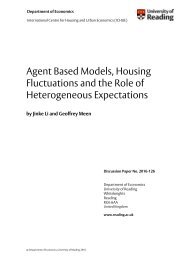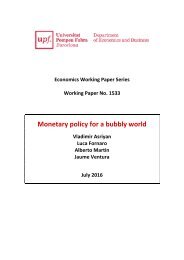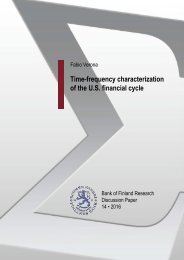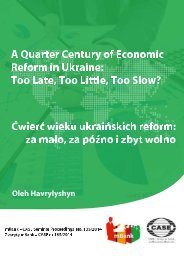Necessity as the mother of invention monetary policy after the crisis
n?u=RePEc:dnb:dnbwpp:525&r=mac
n?u=RePEc:dnb:dnbwpp:525&r=mac
You also want an ePaper? Increase the reach of your titles
YUMPU automatically turns print PDFs into web optimized ePapers that Google loves.
<strong>Necessity</strong> <strong>as</strong> <strong>the</strong> mo<strong>the</strong>r <strong>of</strong> <strong>invention</strong>:<br />
Monetary <strong>policy</strong> <strong>after</strong> <strong>the</strong> <strong>crisis</strong> *<br />
Alan Blinder a , Michael Ehrmann b , Jakob de Haan c,d,e , and David-Jan Jansen c<br />
a Princeton University<br />
b European Central Bank<br />
c De Nederlandsche Bank<br />
d University <strong>of</strong> Groningen<br />
e CESifo<br />
October 2016<br />
Abstract<br />
We <strong>as</strong>k whe<strong>the</strong>r recent changes in <strong>monetary</strong> <strong>policy</strong> due to <strong>the</strong> financial <strong>crisis</strong> will<br />
be temporary or permanent. We present evidence from two surveys—one <strong>of</strong><br />
central bank governors, <strong>the</strong> o<strong>the</strong>r <strong>of</strong> academic specialists. We find that central<br />
banks in <strong>crisis</strong> countries are more likely to have resorted to new policies, to have<br />
had discussions about mandates, and to have communicated more. But <strong>the</strong><br />
thinking h<strong>as</strong> changed more broadly—for instance, central banks in non-<strong>crisis</strong><br />
countries also report having implemented macro-prudential me<strong>as</strong>ures. Overall, we<br />
expect central banks in <strong>the</strong> future to have broader mandates, use macro-prudential<br />
tools more widely, and communicate more actively than before <strong>the</strong> <strong>crisis</strong>. While<br />
<strong>the</strong>re is no consensus yet about <strong>the</strong> usefulness <strong>of</strong> unconventional <strong>monetary</strong><br />
policies, we expect most <strong>of</strong> <strong>the</strong>m will remain in central banks’ toolkits, <strong>as</strong><br />
governors who gain experience with a particular tool are more likely to <strong>as</strong>sess that<br />
tool positively. Finally, <strong>the</strong> relationship between central banks and <strong>the</strong>ir<br />
governments might well have changed, with central banks “crossing <strong>the</strong> line”<br />
more <strong>of</strong>ten than in <strong>the</strong> p<strong>as</strong>t.<br />
Keywords: <strong>monetary</strong> <strong>policy</strong>, central banks, surveys<br />
JEL cl<strong>as</strong>sifications: E52, E58<br />
* Prepared for <strong>the</strong> 64th Panel Meeting <strong>of</strong> Economic Policy in Florence, 14-15 October 2016. The paper presents results from a<br />
survey among heads <strong>of</strong> central banks and academic economists. We are very grateful for all <strong>the</strong>ir contributions. We also thank<br />
<strong>the</strong> editors, our referees, Ben Bernanke, Chris Sims, Christiaan Pattipeilohy, Gabriele Galati, Jan Willem van den End, Klaus<br />
Adam, Marcel Fratzscher, Mark Watson, Mervyn King, and Richhild Moessner <strong>as</strong> well <strong>as</strong> seminar and conference participants<br />
at <strong>the</strong> Bank <strong>of</strong> Canada, de Nederlandsche Bank, <strong>the</strong> European Central Bank, <strong>the</strong> 48 th MMF Group Annual Conference, Brunel<br />
University and <strong>the</strong> University <strong>of</strong> Lisbon for thoughtful comments. We thank Henk van Kerkh<strong>of</strong>f for statistical <strong>as</strong>sistance. This<br />
paper w<strong>as</strong> written before <strong>the</strong> second author joined <strong>the</strong> European Central Bank. Views expressed in this paper do not necessarily<br />
coincide with those <strong>of</strong> <strong>the</strong> European Central Bank, de Nederlandsche Bank, or <strong>the</strong> Eurosystem. The Managing Editor in charge<br />
<strong>of</strong> this paper is Refet Gürkaynak.<br />
1








